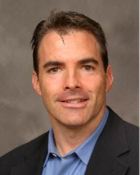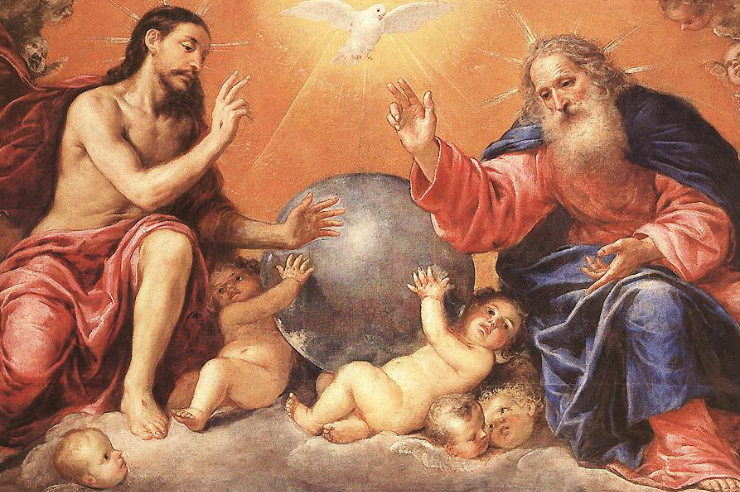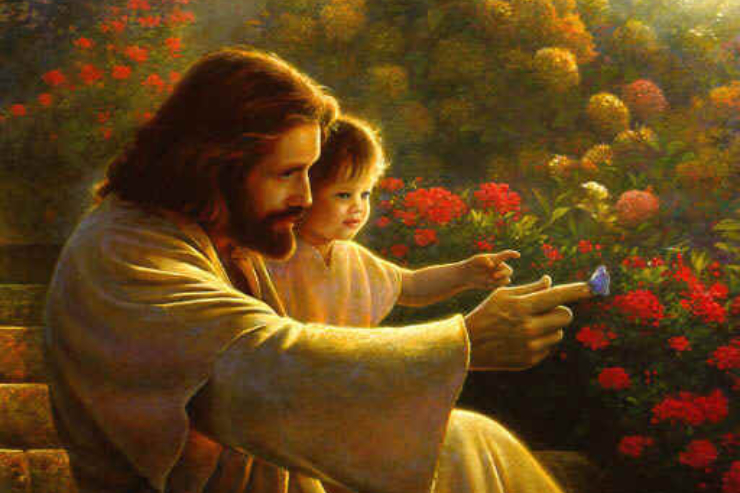
Saint Peter
It was a beautiful spring day in Dublin Ireland. I was finished with my work meeting and decided to walk through the park near my hotel. The park was crowded with people, sitting on the grass, playing catch near a pond, reading books under a tree or just enjoying the rare sunshine in this area of the world where it rains—a lot. I decided to sit on a rock and just relax before my dinner with colleagues.
Settled on my new perch and watching people around me, I noticed two young Mormon men sitting just to my left talking to a girl.
I overheard them making a point to her saying, “Yes we are Christian, we just believe a few different things about Christianity that’s all.”
She looked confused but interested. Then she asked, “What are the differences?” Now, here is where things got really interesting.
One of the young men said, “Like a lot of Christians, we don’t believe in the Trinity the same way, but we do believe in God the Father, Jesus the Son and the Holy Ghost. We all agree that Jesus is our Savior and we will judged by him.”
Now she was perplexed and asked, “If we are all basically the same, then why were you sent on a mission to Dublin instead of to an area of the world where people never heard of Jesus?”
Great question I thought, now here comes the statement that stuck in my craw me the rest of the night.
He continued, “Because the Church became apostate and corrupt after the death of the last apostle, God removed the church from earth to protect it from error until 1823 when Joseph Smith, our Mormon founder, restored the true church through revelation from God spoken to him by the prophets…”
She interrupted, “Well I’m Catholic, which church became apostate?”
He answered, “The Catholic Church.”
Well, I just could not hold back any longer, especially since they were literally sitting right behind me! I said, “I’m sorry to interrupt, but can I ask a question?” These boys were very friendly and cordial (no surprise with well-trained Mormon missionaries from Salt Lake City, Utah), I asked, “What if there was no apostasy? If there was no apostasy, then there was no need for a restoration, correct?”
They agreed with this premise, so I challenged, “You essentially need to prove the apostasy; if you cannot, your position falls flat. Can you provide evidence, proof of this alleged apostasy?”
My question caught him off guard, but after a moment he said, “After Peter died in Rome, Bishop Linus corrupted the church and fell away from the true faith by introducing pagan Roman rituals…”
I asked, “When did this happen?”
He said, “101 A.D.”
I countered, “St. Peter was martyred in A.D. 67 and the keys of the kingdom were handed to Pope Linus who died a few years later. By the year 101, St. Evaristis, the fifth pope and fourth successor to St. Peter was leading the Church. Today, Pope Francis is the 265th successor to St. Peter. This is documented history acknowledged even by Protestant scholars.”
Now here was the problem. While I was attempting to disprove the Mormon myth of the “Great Apostasy” which would then undermine the need for a “Great Restoration,” the young man did not stay on point and his answers danced all over the place. There were comments about an alleged female Pope Joan, a time in the middle ages when there was more than one pope, bishops having children, all the way to the recent priest scandal that rocked places like Ireland.
I defended the Church and launched multiple counter arguments addressing the controversial legacy of Joseph Smith teaching polygamy, open racism in LDS church teaching until recent years, the Mormon massacre of the Indians, works-based salvation and many others. Ultimately, I raised the teaching that one can reach celestial heaven and become a deity over another world.
I pointed out that the Sacraments, including the Eucharist, are biblical and present in the Church’s teaching in the first century.
I made my arguments, he believed he could counter them, so back and forth we went until it was time to go.
The Mormon missionaries offered both of us a copy of the Book of Mormon. She accepted it and I rejected it telling him I already had one.
The girl thanked me and said, “This is all super interesting, I learned a lot from this discussion.”
At this point, my colleagues from work were texting me to meet at the restaurant and the girl’s boyfriend walked up. He caught the end of this friendly ten round fight with no knockout punch and summarized by saying, “Hey, at least we can have this discussion without blowing each other up like ISIS in Manchester…” a reference to a horrible terrorist attack from earlier that week. We agreed to be respectful in our differences.
The girl concluded, “Everyone will find out the truth in the end someday,” and they both walked away.
I felt empty. This seemed to gloss over the encounter and seemed like a secular comment very popular with today’s young people, “Your truth is your truth and mine is mine, who cares anyway?”
Back at the hotel, I was mulling over all the points discussed in the park. I wish I had more time, a better forum to debate and a wider audience. Did I accomplish anything? Did I cause harm? Reviewing the events, I felt as if I casted doubt on his anti-Catholic assertions but also missed many moments. In some ways, I had him and he slipped away, like a wrestling match when before your opponent is pinned to the mat, you let him slip out and escape defeat.
At that moment, I realized I was staying in a Marriott hotel and the book of Mormon was always in each room (founders of Marriott were Mormon). I opened the bedside drawer and pulled out the Bible and Book of Mormon. How interesting to have these two books right next to each other.
I decided to close my eyes and open each book at a random page, pointing to a scripture verse and reading it aloud. I was alone, the room was quiet but somehow, I felt God watching. I picked up the books. Suddenly, I felt the presence of the Holy Spirit. I first opened the Book of Mormon to page 526, verse 13 of the book of Moroni, “Wherefore, if little children could not be saved without baptism, these must have gone to an endless Hell.” Their Prophet Moroni taught that infant baptism is an evil abomination (chapter 8) which is why they only subscribe to adult baptisms of repentance and even baptize deceased members of their families in special ceremonies baptizing dead people. Baptizing the dead has never been recognized as a valid ordinance in Catholic tradition.
Then I opened the Bible. As fate would have it, I opened the book to Peter. 1 Peter 3:15, “Always be prepared to defend your faith and hope in you but do it in reverence and charity.” Of all books to open to, it was neither in the Old Testament connecting us to our Jewish ancestors nor the Gospels that outline our Christian faith. It had to be a letter from St. Peter, our first Pope, to whom Jesus gave the keys of the kingdom of Heaven and prayed specifically for Peter to “feed my lambs.”
Simon Peter, whose name was directly changed by Jesus, was the leader of the Twelve and first of the apostles, along with the Beloved Disciple, to witness the empty tomb. The crucifixion itself happened because Jesus claimed to be God, a teaching that now separates us from these Mormons here in the park who teach that Jesus is A GOD but not THE GOD of our Blessed Trinity. Peter was named, “Rock” by Jesus and Mathew 16:18 records Jesus saying, “and on this rock I will build my church, and the powers of death shall not prevail against it.” This shows Peter’s leading role and refutes any notion of a great apostasy.
As I flew back to the States, leaving the Mormon missionary behind to walk the Catholic streets of Dublin, I wished I could have asked one more question. I would like to have asked, “How could the church be apostate for seventeen hundred years, given Christ’s promise that the gates of hell would not prevail against it? Can it not be asserted that the Holy Spirit has protected the Catholic Church over the ages and kept her holy even though it is filled with people who are less than holy, including bad priests and popes?”
My prayer is that God will use these motivated young missionaries who travel the world preaching a false gospel, to challenge the faithful and bring the Christians back to the Church Jesus started, the same community of believers identified in A.D. 110 by St. Ignatius of Antioch, the One, Holy, Catholic, and Apostolic Church.















